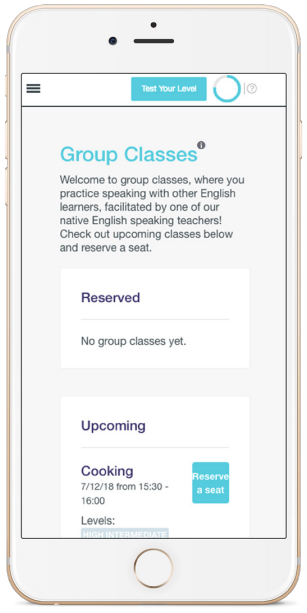The UNIVERSITY OF MARYLAND EMPOWERS RESIDENCE HALL EMPLOYEES WITH LANGUAGE UPSKILLING, QUICKLY IMPROVING COMMUNICATION AND COLLABORATION
The Institution
The University of Maryland (UMD), College Park is the state’s flagship University and a leader in research, entrepreneurship, education and innovation. Committed to diversity and inclusion, UMD is home to more than 41,000 students, 14,000 faculty and staff, and an impressive 377,000 alumni and counting. The University’s Department of Residential Facilities employs 250 dedicated residence hall workers, approximately 70 of whom have varying levels of English proficiency.
UMD strives to empower its residence hall employees with the language training needed to improve proficiency levels, better communicate with students and staff, and have paths for career advancement. With this in mind, the Department sought a new language training provider that would address the needs of this cohort of English language learners (ELLs) and of the needs of the Department.
Diane Cabrales, Training Manager of Residential Facilities, helped UMD establish clear priorities - starting with finding a program that would maximize the impact on employee productivity as learners continued building their language skills.
The Challenge
“Voxy EnGen allows us to offer help in improving English skills to many staff (40). Our Department offers 30 minutes of work time a day, 3 days a week to practice English on Voxy EnGen, and that time is spent actively learning. Best of all, staff can invest as much of their own time learning English as they want, and they can progress at their own pace.”
Because some residence hall workers had limited English proficiency, supervisors were unsure if these incumbent workers understood official documents and training, including safety risks, required procedures, and benefits information. Managers also lacked knowledge of the proficiency levels of each staff member. While UMD offers face-to-face classes campus-wide, the face-to-face classes alone did not meet the needs of the residence hall employees.
One major hurdle was that classes were held twice a week, across campus, and required staff to be away from their work for two or more hours at a time. On top of this, employees in the program needed to be transported by supervisors, further decreasing team productivity. This limited the number of employees that could participate. Furthermore, even if employees attended in-person classes consistently, supervisors still had no insight into the effectiveness of these classes.
A sentiment among supervisors was that residence hall employees participated in the program for a long time but showed no tangible advancement in their English language skills. The Department was searching for a new way to help residence hall employees with their English skills that would be more flexible and effective, and available to more employees to use instead of UMD’s face-to-face language training program.
An Innovative Solution
The solution came in October 2019 when UMD launched a new Voxy EnGen program. The Voxy EnGen pilot program was tasked with three important goals: offering visibility into employee engagement, improving staff proficiency levels, and facilitating better communication with students and staff.
One immediate step was to assign employees 30-minute time slots to study three days a week, instead of the two to three-hour blocks of time required with the face-to-face program. Voxy EnGen’s lessons are offered in short, discrete chunks, making them an excellent candidate for microlearning, which is bite-sized training that delivers information in a flexible, easy-to-digest format. Learners are able to practice lessons on mobile devices at their own convenience, eliminating the need to travel across campus.
With the Voxy EnGen Command Center, Diane is now able to observe platform usage and motivate employees to take advantage of the 30-minute sessions assigned during their work days.
Today, Diane, through the Voxy EnGen program, can see how engaged employees are with learning English and how much they have improved, information she didn’t have access to previously. Also the Department is no longer weighed down by the logistical challenges of traveling across campus for classes.
The Results
From October 2019 to January 2020, resident hall learners in the Voxy EnGen program surpassed recommended study times with very high levels of engagement. Voxy EnGen’s suggested study recommendations for language learners in this training program were two and a half hours a month.
The first three months of this pilot program took place over the holiday season, when engagement rates in training programs often plummet. Despite this, in November learners used Voxy EnGen for an average of six hours per month while December averages were over four hours per month. Given these high levels of engagement with the platform, it is not surprising that learners are showing early indicators of proficiency improvement.
At the start of every Voxy EnGen program, learners take the Voxy EnGen Proficiency Assessment (VPA), a standardized evaluation of each learner’s English proficiency level. After only three months, 27% of learners improved an entire proficiency level, with the majority of learners improving their proficiency scores within their starting levels. More importantly though, supervisors observed improved English communication skills and confidence among the residence hall staff.
With the visibility Voxy EnGen’s Command Center provides, Diane is able to demonstrate the effectiveness of the Voxy EnGen program compared to the face-to-face only classes. Improved visibility and measurable proficiency improvements all lend a hand in proving a return on investment (ROI) to UMD’s stakeholders, a beneficial result that makes the case for expanding Voxy to language learners in other relevant departments across the University.
Ready to launch your own upskilling program?
Get a demo of the Voxy EnGen platform and discuss your language upskilling goals with one of our workforce development experts today.


